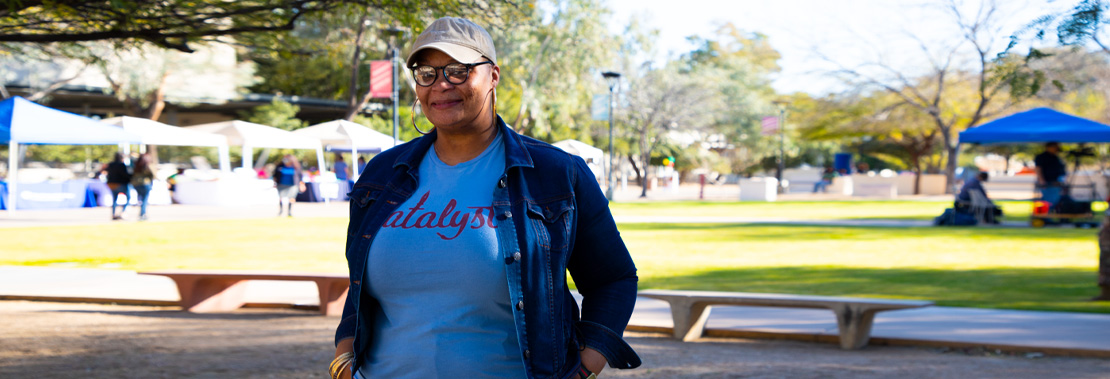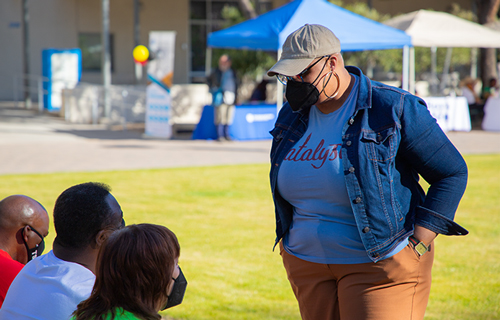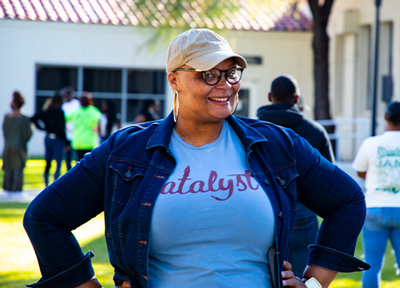
Black History Month Panel Moderator: Tech a Key to Positive Future
Dr. Treya Allen helps PCC create conversations focused on health and wellness in a diverse community
Treya T. Allen, Ed.D., teaches Pima’s African American Studies courses, which she helped develop. She also teaches Student Success courses and, through the Teaching and Learning Center, has trained instructors on hyflex teaching, a combination of hybrid and virtual formats. At the University of Arizona, she helps instructors build more diverse and inclusive courses.
Do you think it has been more difficult to build interest in Black History Month activities during the COVID-19 pandemic?
Actually, I don’t. I think that now we’re in the digital iteration of higher education to actually be more clear about what Black History Month is. We have this opportunity to clarify that Black History Month is about a celebration. It’s not just past things, but it’s a Black history — that creative innovation and expertise — that allows us to be here in the present and allows us to imagine a future.
I don’t think that the COVID pandemic has harmed that. In many ways, I think it’s exposed more of us to it. I think, with the untimely murder of Mr. Floyd, we’re now in a society that’s hyper-vigilant about certain things, but they still get it wrong. So, I don’t think building interest in Black History Month has ever been an issue, especially in the middle of a pandemic.
Health and wellness are the themes of this year’s celebration. Why are those topics the focus, especially now?
We’re always talking about the degradation of Black communities, but we never talk about resistance models and resistance models that focus on health and wellness. You know, James Baldwin said, and I’m paraphrasing, “to be conscious of who I am as a Black person in this country and understand where I’m at is to be in a rage at all times.” So it’s very important for us to understand that health has to be a part of this conversation, because we know that African Americans, outside of eating preferences and access to health care and just poverty, have the highest incidence of certain illnesses and diseases that don’t just start because we’re not eating well. A lot of this has to do with environmental factors as well: access to health care; food deserts — are we in them; or how do we revive African indigenous food ways?

The other thing is, when we talk about health and wellness, we’re not simply talking about physical health and wellness. There are eight dimensions of health and wellness that we don’t touch on because we are so into telling the slavery story. But we’re more than that. It also is important because we definitely need to start addressing some of the deleterious effects of this thing that was called the enslavement here in the United States.
Dr. Joy DeGruy talks about Post Traumatic Slave Syndrome, where we haven’t even dealt with the generational impact of this complex PTSD that we’ve experienced, and what that looks like for relations in regards to community actors, and social and state actors. It becomes more important that we address these things from a place of wellness and not just degradation, which is why the health conversation is super-important. We need to not just problematize, but also talk about what’s going well and resistance and survival and joy and love and laughter.
The local health practitioners on the Feb. 15 panel – Spiritus Wellness founder and CEO Zami Tinashe Hyemingway, MSW, MAST; nurse practitioner Keyshanna Terry, MSN, FNP-C and pediatrician Duane Dyson, M.D. – have varied expertise. How will their perspectives complement each other?
While the panel is not addressing all eight dimensions of health and wellness, what I do think is really, really important is that we are bringing on practitioners and professionals who can speak to different areas. So, even though the nursing side might be different from the pediatrician side, which might be different from community social work health and wellness, all of these — as well as enabling the active growth of positive well-being and positive health outlooks — are very necessary in preventative medicine. as well. These different perspectives will then allow us to address health on different levels and give us some tangible things to work with.
What I love about Zami is, it is a master’s level, licensed social worker as well, and so they can really speak to this idea of all the determinants around the individual that allow us to imagine our best selves. So what does it look like to be preventative and not just reactionary?
KeyShanna, our nurse practitioner, brings to mind all of the things to kind of take care of ourselves in the day-to-day practices and avoid getting to the point where we need you know that reactionary care.
Dr. Dyson’s main focus is pediatrics, so he knows how to address things in our youth and not wait until we get to a certain age where we could have been doing better if we had known sooner.
How do the healthcare and wellness experiences of black and African American students differ from those of older adults, say, their parents or grandparents?

I think it’s enhanced by technology. They have access to health and wellness, and also the encouragement to seek out these things in ways that even myself or my mother’s generation did not have back in the day.
We also have lots of information around food and finances. And, we see students who are looking for other options so that they won’t impact their future lives with loads of debt.
And I also think they’re willing to say things in this new technological age that we weren’t able to see or to say in ways before. We’ve always protested. We’ve always fought for certain things. But, I think the youth, through the use of technology and having access to the stories of those who came before them, have been able to advocate for themselves and others in ways that maybe we didn’t have before.
What do you hope students will take away from the panel discussion? Adults?
I want them to see other people who look like them, whether you are Black presenting or you share some very similar backgrounds or other salient or passive identity. I also want them to see the possibilities for their lives and not just career-wise but also health-wise and financially, and action steps that they can be taking today to kind of improve their outcomes whatever those outcomes may be and whatever they desire those outcomes to be.
I want adults to take away that it’s never too late to change. I want them to see themselves in the panel, and I want them to learn something and then go forth and share that something with someone else.
What else would you like to tell Pima students and potential students related to Black History Month/the importance of diversity, equity and inclusion in society?
Black History Month is not just about the past. It is also about the future — in the future that we can all come together to create, regardless of your racial or ethnic background. Because, when MLK was creating the beloved community and Kingian philosophy, it wasn’t just for Black folks. It was for imagining a world where our differences do not define our oppression and that we stand up together and fight oppression on every level. So Black History Month allows us to revisit and celebrate our past that got us here to this very moment, and then from here — from this moment in the present — launch into an amazing future.
I think the importance that I want to stress about diversity, equity and inclusion is that it’s not just about race. It’s about how people have access, even in the classroom. How do people have intellectual access? Can you afford the books? Are you not learning? Do you have the right to determine how you will show up in a classroom? Do you have a say so in the learning environment?
"Black History Month allows us to revisit and celebrate our past that got us here to this very moment, and then from here, launch into an amazing future"
But then, also, when you’re working with people who may not share the same background, as you, do you relish the the the opportunity to learn from someone who’s different from you, even if the way they think, the way they look, the way they smell, what they value is completely different from you? This is the beauty of diversity, equity and inclusion — that when we allow ourselves to grow in ways and expose ourselves to things that this may not be how I live my life in my four walls, but when I do, that I am allowing my brain to grow and I’m increasing my capacity to learn from every part of life. More importantly, I want everyone to understand that diversity is not enough, inclusion is not enough, equity is not enough. We have to be aware of these things, but also be aware of our history, and understand how the history, the greater history of the United States of America — this American society — has gotten us to this point and how we can launch into a better future. We can’t do that without understanding diversity, equity and inclusion — there’s no way we get to justice without considering those things first.
Interested in our events or African American studies?
We want to welcome anyone who is coming to our events this month and welcome you to reach out to Dr. Allen via email at tallen4@pima.edu if you’re interested in African American studies here at Pima. You can also contact Dr. Allen if you’re interested in how you can contribute and support our students who are building a brighter future as we are having this conversation.
Additionally, we invite you to sign up today for our Dr. Allen's Zoom Panel Health, Healing and Wholeness — Necessary Black History Month Conversations held on February 15 from4:00 - 5:30 p.m.